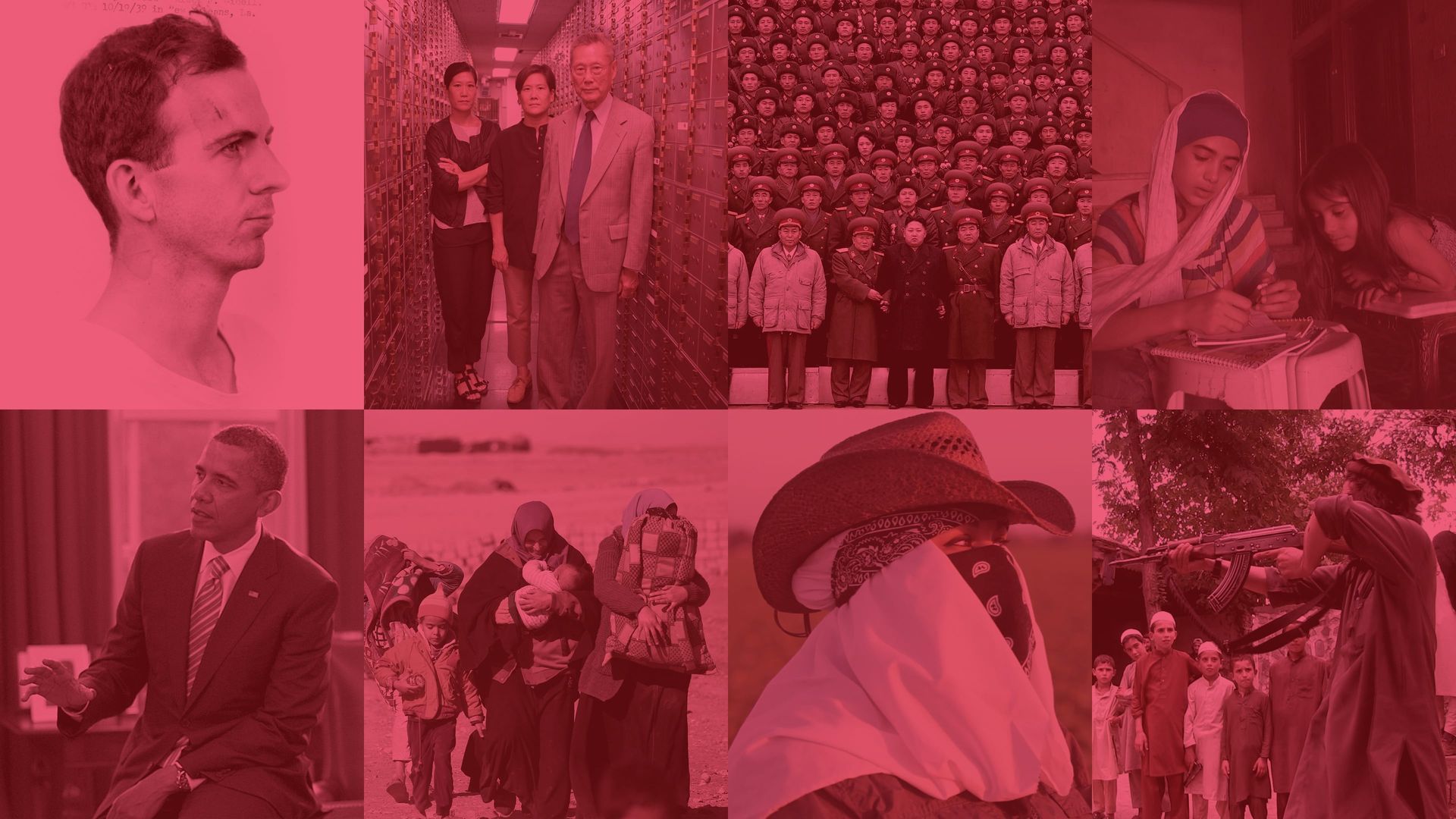

Frontline
Season 6
TV-MA
Since it began in 1983, Frontline has been airing public-affairs documentaries that explore a wide scope of the complex human experience. Frontline's goal is to extend the impact of the documentary beyond its initial broadcast by serving as a catalyst for change.
Where to Watch Season 6
24 Episodes
- Apartheid Part I: 1652-1948E1
Apartheid Part I: 1652-1948Many white South Africans claim that the entire country is theirs by right. No black man, they say, occupied South Africa before the first tiny Dutch settlement in 1652. Part 1 refutes this claim and traces the country’s colonial history, the emergence early in the 20th century of the African National Congress, the rise to power of Afrikaner nationalists, and the formal policy of apartheid. - Apartheid Part 2: 1948-1963E2
Apartheid Part 2: 1948-1963Part 2 details the new policy which included classifying all South Africans by race, removing blacks from cities where many had lived for generations, and establishing separate and unequal schooling for blacks. Frontline focuses on the increasing black resistance in the 1950s and the rise of resistance leader Nelson Mandela. - Apartheid Part 3: 1963-1977E3
Apartheid Part 3: 1963-1977Independent homelands' for blacks was the centerpiece of Prime Minister Hendrick Verwoerd's vision of apartheid. Part 3 focuses on how the white government found African leaders to collaborate with them in a plan to make foreigners of black South African citizens by deporting them to independent homelands in rural areas of the country. The program looks at the increased resistance to the homeland policy as seen through the first nationwide attack by young black South Africans in the Soweto ghetto in 1976. - Apartheid Part 4: 1978-1986E4
Apartheid Part 4: 1978-1986When PW Botha became prime minister of South Africa two years after the Soweto uprising in 1976, he realized that apartheid must ‘adapt or die.’ Part 4 explores the reforms undertaken by Botha to maintain white supremacy, changes that have deeply divided Afrikaners and have provoked explosive reactions from many blacks. - Apartheid Part 5: 1987E5
Apartheid Part 5: 1987Part 5 looks at an unprecedented meeting in the struggle for South Africa’s future. Two years before the release of Nelson Mandela, dissident white Afrikaners met with black leaders from the outlawed African National Congress in Dakar, Senagal, to discuss strategies for change in South Africa, presaging the reforms that would come later. - Operation Urgent FuryE7
Operation Urgent FuryPulitzer Prize-winning reporter Seymour Hersh investigates one of Ronald Reagan’s greatest truimphs-the rescue of American students during the 1983 invasion of Grenada. Hersh’s reporting reveals an inept US military operation and questions whether the students needed rescuing at all. - The Man Who Shot John LennonE8
The Man Who Shot John LennonFrontline goes inside the mind of Mark David Chapman, the man who shot and killed John Lennon in 1980. Newly acquired records paint the chilling portrait of a celebrity stalker who meticulously planned the murder, believing it would make him famous. - Shakedown in Santa FeE10
Shakedown in Santa FeEight years after one of the most violent prison uprisings in US history, Frontline returns to the penitentiary in New Mexico to probe the contininuing struggle between the inmates and the guards, the wardens and the reformers, for control of one of our most dangerous prisons. - Let My Daughter DieE11
Let My Daughter DieJoe and Joyce Cruzan want doctors to remove their severely brain damaged daughter from the life-support system that keeps her alive. Nearly two years before it became the US Supreme Court’s first right-to-die case, Frontline explored the complex legal and moral issues of this Missouri couple’s battle to allow their daughter to die. - Back in the USSRE12
Back in the USSRIn 1968, American journalist Jerry Schecter, accompanied by his wife and five young children, moved to Moscow on assignment for Time magazine. In 1987, Frontline returned with the Schecter family to the Soviet Union as they renewed old friendships and explored Russia under glasnost. - To a Safer PlaceE14
To a Safer PlaceWhen Shirley Turcotte was a child, she was sexually abused by her father. After years of therapy she takes a remarkable journey back into her past-confronting her mother and other adults who failed to protect her, reuniting with her brothers and sister who were also brutally abused, and trying to make peace with the horror story that was her childhood. - Murder on the Rio San JuanE15
Murder on the Rio San JuanFrontline investigates the unsolved 1984 terrorist bombing at a press conference held by contra leader Eden Pastora. Eight people, including an American reporter, died that night on the border between Nicaragua and Costa Rica. This report dissects the motives of possible conspirators and follows the trail of the man suspected of planting the bomb. - American Game, Japanese RulesE16
American Game, Japanese RulesCan America succeed in Japan? Frontline paints an intimate portrait of Americans living and working in Japan-baseball players, businessmen, and an American bride-all confronting a society that looks Western, but operates by a very different set of rules. - Racism 101E17
Racism 101Frontline explores the disturbing increase in racial incidents and violence on America’s college campuses. The attitudes of black and white students reveal increasing tensions at some of the country’s best universities where years after the civil rights struggle, full integration is still only a dream. - The Defense of EuropeE19
The Defense of EuropeFrontline and Time magazine join forces to examine the new realities for the NATO alliance following the American-Soviet nuclear arms treaty. How good are the Warsaw Pact forces? Can Europe defend itself without nuclear missiles? Will America begin to pull out its troops? - The Choice
 E20
E20The ChoiceOne of the most memorable presidential races in decades pits the iconoclast John McCain against the newcomer Barack Obama; a heroic former prisoner of war against the first African-American major party nominee. The 20th anniversary broadcast of "The Choice" examines the personal and political biographies of these men and goes behind headlines to discover how they arrived at this moment and what their very different candidacies say about America. - Who Pays for AIDS?E21
Who Pays for AIDS?By 1991, health care for AIDS patients in the United States could cost an estimated $16 to $22 billion. Caring for AIDS victims is overwhelming some communities. Frontline examines the impact on patients caught in the middle of a battle between local governments and Washington over who will pay for AIDS. - Our Forgotten WarE22
Our Forgotten WarIn Central America, while US attention has been dominated by the contra war in Nicaragua, the battle for El Salvador continues. The US government has dumped nearly $3 billion in aid into El Salvador (more than ten times the amount spent on the contras), but there are new signs that the American policy is in trouble. With exclusive footage shot behind guerilla lines, Frontline takes a fresh look at the war in El Salvador. - Indian CountryE23
Indian CountryThe Quinault Indians of Washington State seem to have everything-strong leadership, a landmark court victory guaranteeing fishing rights, business deals with the Japanese, and a lush, beautiful reservation. But the Quinaults still face crushing problems-unemployment, poverty, alcoholism, and suicide. Frontline reporter Mark Trahant searches for answers to the Quinault's dilemma in the Bureau of Indian Affairs, Congress, the White House and in the heart of the Quinault people. - My Husband is Going to Kill MeE24
My Husband is Going to Kill MeIn February 1987, 30 year-old Pamela Guenther turned to the police and the courts in a Denver suburb for protection from her violent husband. Three weeks later, as her children watched, she was murdered. Frontline asks why the system could not protect Pamela Guenther.


